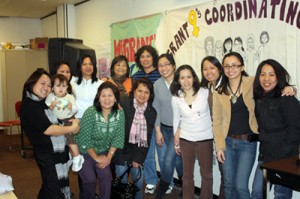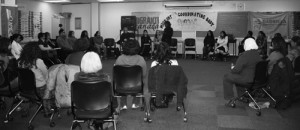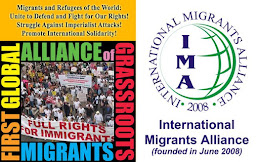March 1, 2010
By Pet Cleto
Participants in the Migrant Women’s Coordinating Body for International Women’s Day education session on women’s struggles in Toronto.
The Migrant Women’s Coordinating Body was organized three years ago by women who aimed to strengthen the voices of migrant women and make them an important force for change in Canadian society. Its member organizations are: GABRIELA, Migrante-Ontario, BASICS Free Community Newsletter, Thorncliffe Neighbourhood Office, Justice 4 Migrant Workers, METRAC, Canadian HART, SAWRO, and CUPE Local 4308.
While the first education day (January 21, 2010) focused on international and liberation struggles of the various countries from which migrant women workers come from, the February education day highlighted women’s struggles in Toronto and Canada.
Xolisiwe (Connie) Ndlovu, now the Vice-president of CUPE Local 4308 and a personal support worker, is a refugee from Zimbabwe. She spoke of her fight, since 2002, against the obstacles put on the path of many newcomers by class conflict, racism, and imperialism. Her story starts, like most newcomer stories start, with the demeaning of her previous education and work experience. In her union work, she now challenges issues produced by racism and class-conflict: low wages, lack of benefits and inadequate sick leaves. A strong advocate for equality and equity in our society, she sees the oppression inflicted on women and children today as a violence that is done in the name of “capitalism”.
Amber O’Hara spoke about Canada’s missing or murdered aboriginal women, in whose honour she has dedicated her 18-year long work of research and documentation. The women victims now total 800 in her list, and most of their cases remain unresolved. In 1993 she formed Manitou Kwe singers, a women’s hand drum group which performs specifically these aboriginal women and as well, for justice for people in prisons. Her activism is also driven by a personal loss: the murder of her cousin Carolyn Connolly on August 2, 2008.

Nine organizations were represented in the education day of International Women’s Day held in Toronto on Feb. 21, 2010.
However, the fundamental changes that Migrante has raised and brought to the attention of politicians still await some government action. Among them: permanent residency upon arrival, the un-locking of LCP workers from the two-year live-in requirement, and the ratification of the ILO Convention for Migrant Workers and their Families (which would give migrant workers equal rights as workers who are native to the migrant workers’ “host countries”).
The South Asian Women’s Rights Organization (SAWRO) was represented by Sultana Jahangir, who very vividly described the different specific forms that imperialism and capitalism take in the lives of migrant and newcomer women. She called upon everyone to continue sharing their experiences, and to join their hands together in order to advance their common objectives.
Speaking about her work at the Thorncliffe Neighbourhood Office, Ambreen Akbar also gave testimony to the numerous instances when exploitation and oppression have made, and continue to make, the lives of women almost unbearable.
The Migrant Women’s Coordinating Body welcomes the public to its cultural celebration on Friday evening, March 5, Friday, at the Steelworkers’ Hall, in honour of women’s struggles and victories. On International Women’s Day this year, on Saturday, March 6, it will lead a contingent of workers’ groups, grouping together in front of the Ontario Institute for Studies in Education at 252 Bloor Street West, to join the IWD march as a valiant voice of migrant women workers in Canada. A potent voice for the liberation of Canada’s migrant women has risen.##
INTERNATIONAL WOMEN’S DAY: Strengthening the Voices of Migrant Women

No comments:
Post a Comment